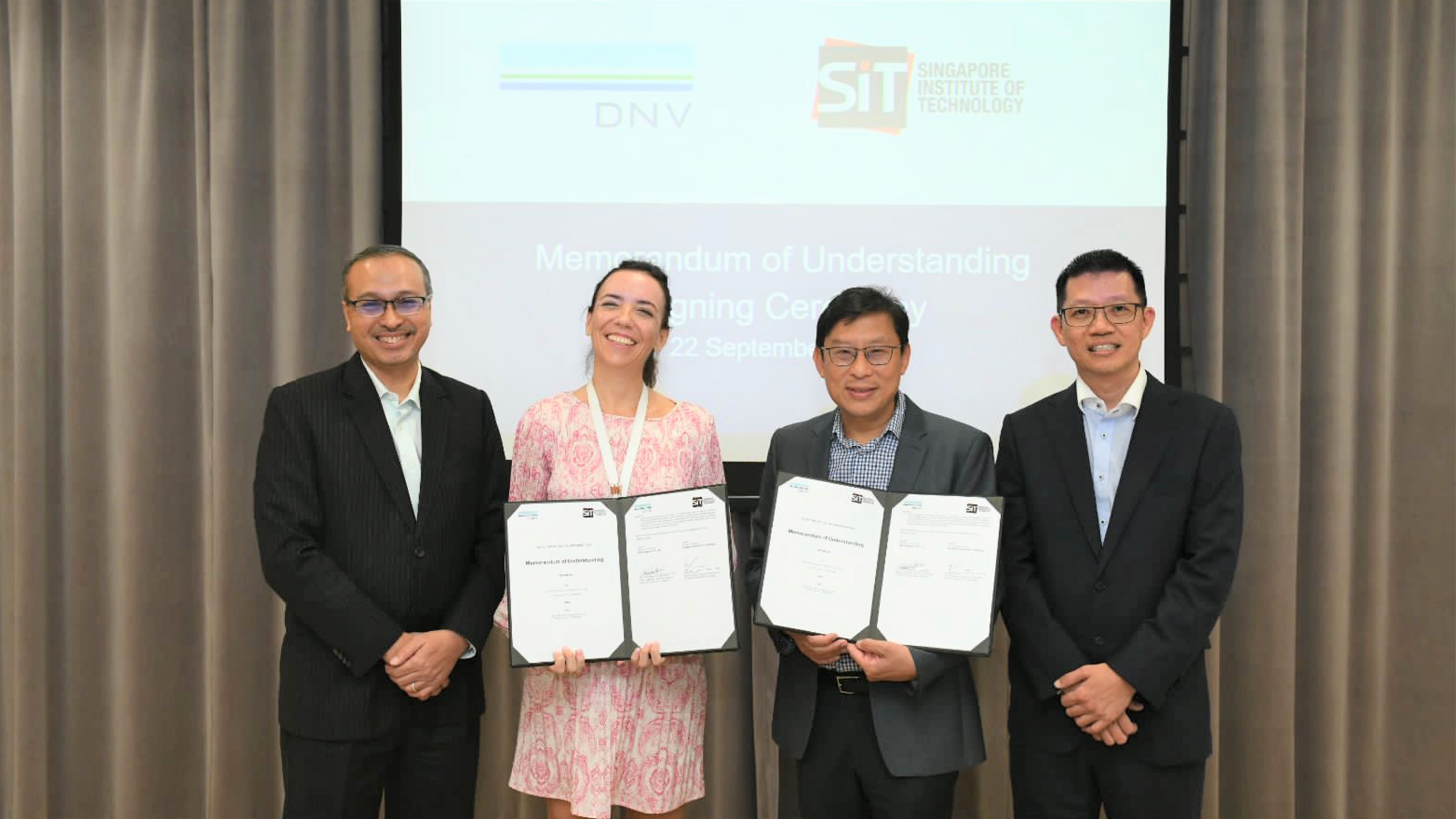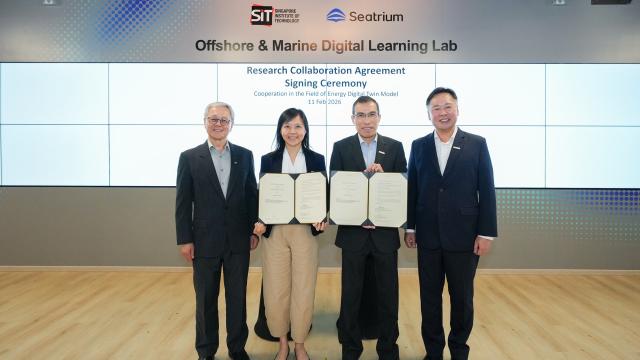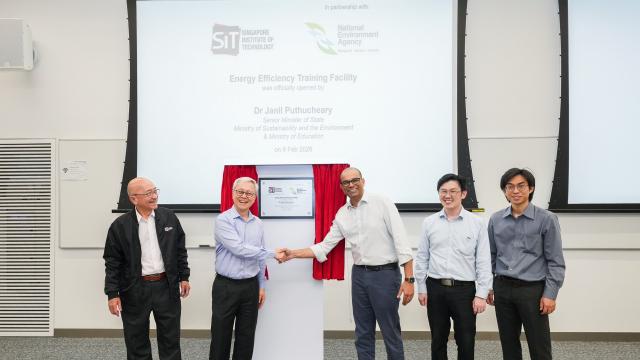The collaboration will focus on knowledge exchange and research initiatives to further advance Singapore’s maritime ecosystem's efforts.
DNV and the Singapore Institute of Technology (SIT) have signed a Memorandum of Understanding (MOU) to explore opportunities to advance net-zero ambitions in Singapore’s maritime sector and actively support the new generation of workforce.
As part of the three-year partnership, DNV Maritime Decarbonisation & Autonomy Regional Centre of Excellence will help spearhead multiple Research & Development (R&D) and educational initiatives in collaboration with SIT’s Sustainable Maritime Engineering Strategic Translational Research Programme.

The MOU signing at DNV Singapore was represented by (from left to right) Dr Shahrin Osman, Director, DNV Maritime Decarbonisation & Autonomy Regional Centre of Excellence; Ms Cristina Saenz de Santa Maria, Regional Manager, Maritime, DNV; Mr Bernard Nee, Vice President, Industry & Community, SIT; and Associate Professor Kenneth Low, Deputy Cluster Director, Engineering, and Programme Leader, Naval Architecture and Marine Engineering, SIT. (Photo: DNV)
Both parties will cooperate on:
- developing ship and system designs using simulation-based approaches;
- joint industry applied research projects with entities in the Singapore maritime ecosystem within the areas of decarbonisation and digitalisation;
- a deeper and wider knowledge exchange between the two.
“This MOU represents a new level of collaboration with SIT, and the beginning of a partnership focused on innovation, education and cooperation that will help accelerate the maritime industry’s sustainable transition goals,” said Cristina Saenz de Santa Maria, Regional Manager, Maritime South-East Asia, Pacific and India, DNV.
The MOU will enable DNV to support SIT and other maritime entities in Singapore to use DNV’s Simulation Trust Centre for educational and R&D purposes. Research collaborations between DNV and SIT will focus on advancing zero-emission and autonomous ships; shore remote control and simulation centres; shore charging and future fuel bunkering infrastructure.
Under the agreement, DNV intends to transfer knowledge in maritime decarbonisation and digitalisation to SIT to develop industry postgraduate programmes. The collaboration brings together the university’s applied learning pedagogy and DNV’s Simulation Trust Centre to conduct lessons on optimising ships, and system design for advanced hydrodynamics, energy management system, emission control, and system safety. Students will also gain opportunities to collaborate with DNV on capstone projects in novel maritime technology applications, perform their Integrated Work Study Programme at DNV, and co-organise student competitions.
Dr Shahrin Osman, Director of DNV Maritime Decarbonisation & Autonomy Regional Centre of Excellence, said: “Singapore is a global maritime hub which supports the test-bedding of innovative solutions. It is paramount that we engage both Institutes of Higher Learning as well as industry stakeholders to ensure that R&D efforts and investments are supporting the maritime transformation, and we are proud to lead the change with SIT.”
Prof John Thong, Deputy President (Academic) & Provost, SIT, said: “Our collaboration with DNV offers valuable opportunities for SIT to intensify R&D that will help boost Singapore as a leading and sustainable maritime hub by leveraging new technologies and innovation. Additionally, the close academia-industry partnership will enhance authentic learning for our students and contribute towards capability building in the local maritime industry and across its ecosystem. SIT is delighted to partner with DNV in this endeavour.”
The DNV Maritime Decarbonisation & Autonomy Regional Centre of Excellence in Singapore focuses on maritime digitalisation, decarbonisation and port capabilities to support South-East Asia’s transition to a smart and sustainable future.
Set up in 2021 with support from the Singapore Economic Development Board, the regional Centre of Excellence offers a knowledge-sharing forum for industry roundtables and seminars to engage with all stakeholders on maritime green transition trends, such as LNG, Marine Battery, and Hydrogen/Ammonia as fuel.
The centre also conducts joint industry projects, co-funded by DNV, and supports the sector with tailor-made consultancy projects.
About the Singapore Institute of Technology
The Singapore Institute of Technology (SIT) is Singapore’s first University of Applied Learning, offering industry-relevant degree programmes that prepare its graduates to be work- and future-ready professionals. Its mission is to maximise the potential of its learners and to innovate with industry, through an integrated applied learning and research approach, so as to contribute to the economy and society.
The University’s unique pedagogy integrates work and study, embracing authentic learning in a real-world environment through collaborations with key strategic partners. Its focus on applied research with business impact is aimed at helping industry innovate and grow. Targeted to be ready in 2024, SIT’s centralised campus within the larger Punggol Digital District will feature a vibrant learning environment where academia and industry will be tightly integrated with the community.
For more information, visit www.SingaporeTech.edu.sg.
About DNV
We are the independent expert in risk management and quality assurance. Driven by our purpose to safeguard life, property and the environment, we empower our customers and their stakeholders with facts and reliable insights to make critical decisions with confidence. As a trusted voice for many of the world’s most successful organizations, we use our knowledge to advance safety and performance, set industry benchmarks, and inspire and invent solutions to tackle global transformations.
About DNV, Maritime
DNV is the world’s leading classification society and a recognized advisor to the maritime industry. We enhance the safety, quality, energy efficiency, and environmental performance of the global shipping industry – across all vessel types and offshore structures. We invest heavily in research and development to find solutions, together with the industry, to address strategic, operational, or regulatory challenges.















![[FA] SIT One SITizen Alumni Initiative_Web banner_1244px x 688px.jpg](/openhouse2025/openhouse/sit-teaching-and-learning-academy/directory/centre-professional-communication/sit-teaching-and-learning-academy/directory/sites/default/files/2024-12/%5BFA%5D%20%20SIT%20One%20SITizen%20Alumni%20Initiative_Web%20banner_1244px%20x%20688px.jpg)


